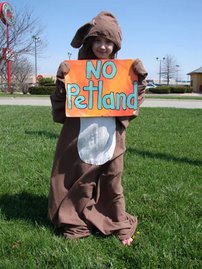About Ben

The parents’ relationship with one another, with their other four children, and with their family and community are shattered as a result of Ben’s existence. The themes/questions invoked are those that make us uncomfortable to explore and discuss, probably because there isn’t a “right” answer, an easy answer, or any type of win-win scenario that emerges as a solution to problems of this nature. Like Frankenstein, it explores the nature and responsibility of the parent (creator) to the child (“monster” or Ben). What is to be done if you create a child/being that you cannot parent? What is your responsibility if the child/being you created/taken responsibility for poses a tremendous threat to the world at large? What is to be done if nobody can or chooses to parent? What is your responsibility if the child will never be able to function in this world—is it kinder to put them out of their misery or to allow them a lifetime of unmitigated misery? What is your responsibility to your existing other children, if one child poses a tremendous threat to their well-being and their very lives? How does a person resolve such split loyalties? Further, these questions can be applied to society at large and the many social problems that we struggle with as a result of these misfits—not all of whom, but many of whom are very dangerous to others and always will be. I was pleased with the conversations that this spurred between L and me. We usually needed a ten-minute chat time after our reading each night to process what we read and how we felt about it.
We are now reading the sequel to this book, Ben in the World**. This book explores Ben’s life as an independent teen and then an adult. He is truly alone and miserable. This is our first exposure to Ben’s inner world, and we found our opinions of Ben dramatically changed with this book. We haven’t yet reached the halfway point of the book, so we may change our minds again before it’s over. I’m intrigued with the author’s skill at really taking from one viewpoint to the other. Throughout the first book, we really felt that Ben should be eliminated. In this book however, I suddenly feel very sympathetic to Ben and his plight of being something he clearly has no choice in or control over. Suddenly I want to protect Ben, rather than kill him. L hasn’t brought up her feelings yet about that topic. I tend to wait for her to bring up issues or questions and respond to them. I don’t want to influence her thoughts or feelings by stating mine first.

Strangely enough, I found some of the themes, particularly those addressing parental split loyalties, applicable to some of the cat issues I’ve been struggling with. When one has committed to raise and protect multiple dependent beings, and the best interests of each of these beings are at odds with one another, what can be done? What if you’re really faced with a zero-sum game: Only one of two can be happy—how does one choose who to save and who to throw under the bus?

As difficult as it is to be a “cat mommy” in this situation, my heart absolutely breaks for the parents of human children who are living this nightmare. How do they deal with one child who poses a mortal threat to their other children and/or themselves? What about if the threat is that of permanent emotional damage, robbing the children of a childhood? I have seen and read stories of these people. I remember one in particular where one child, who was only 9 or 10, was extraordinarily out of control and dangerous to those around her. The parents ended up maintaining an apartment, along with their home, and they took turns living there with the problem child while the other parent stayed at home with the other kids. What a tragedy for all that this was the best possible solution for them. How fortunate for them that they could make it with the additional expense of another household. Many parents would not/do not have that option, and then what?

















No comments :
Post a Comment